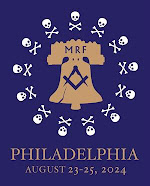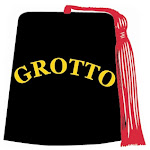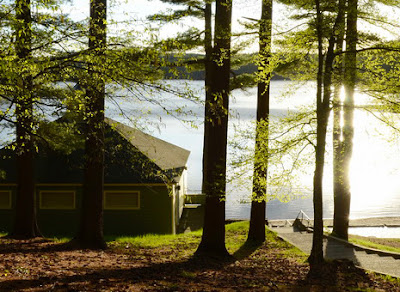Magpie coverage of the stellar lecture on Plato’s Divided Line at the School of Practical Philosophy Saturday night is still to come, but in the meantime I just want to throw out some news briefs from the past few days.
First up, let’s all congratulate Adam Kendall on his election to membership in Quatuor Coronati Lodge 2076! Amazing! (This isn’t the Correspondence Circle. This is the actual lodge—“the premiere lodge of Masonic research in the world,” etc., etc.)
I bet he doesn’t even read The Magpie Mason anymore, but that’s okay. Once you attain such exalted heights, everything changes. So I am told.
 |
|
Courtesy @davisshaver
‘The Bond’
|
On Saturday, the Grand Lodge of Pennsylvania unveiled a pair of bronze statues of George Washington and Benjamin Franklin on the sidewalk outside its headquarters Masonic Temple in Philadelphia. Named “The Bond,” they depict Washington showing his Masonic apron, that he received as a gift from Lafayette, to Franklin. The actual apron is exhibited inside the building, in the museum. The statues themselves are a gift from Shekinah-Fernwood Lodge 246, which meets in the Temple. They are the creation of James West. Check out his most impressive website here.
 |
| Courtesy Ashmolean Museum |
Sunday night I wrote a short essay on the early history of Freemasonry that might be published somewhere, and I included not only the inevitable mention of Elias Ashmole and his initiation into the fraternity in 1646, but also mentioned his bequest that created Oxford University’s museum of art and archaeology, the Ashmolean. And just by coincidence, today is the anniversary of its opening day in 1683. It is the first university museum. Happy anniversary!
I have been writing here about Henry David Thoreau several times of late in this bicentennial year of his birth. Last Friday, the Morgan Library and Museum—a stunning place to visit—opened its exhibition “This Ever New Self: Thoreau and His Journal.” This collection of unpublished writings dwarfs his published work in volume, and gives far more insight into Thoreau the man. More than 100 items have been assembled for this exhibit. It will close September 10. Click here.
Next week, on Thursday the 15th, the Spiridon Arkouzis Lecture Series in Masonic Studies will continue with Iván Boluarte being hosted by the Tenth Manhattan District to present “Pre-Columbian Builders.” Seven o’clock at Masonic Hall in 1530. Photo ID to enter the building, etc.
And finally, and returning to the School of Practical Philosophy (12 East 79th Street), it is having a book sale, and some recordings have been added to the inventory on sale. From the publicity:
 |
| Courtesy School of Practical Philosophy |
JUST ADDED: Select recorded-lecture titles on sale at a 20 percent discount in our wonderful Get Ready for Summer Sale.
Plan ahead and stock up to make your summer an enlightening and enjoyable break. Consider books and CDs as treasured gifts to pass on to friends and family.
During this event, a large portion of our inventory is sale priced at a 20 percent discount and recorded lectures have just been added. Subject areas included: scripture, philosophy, history, language, government, literature, and economics.
Discounted titles will be sold as long as inventory remains, but we suggest you make your choices early since availability may be limited.
Note: Items cannot be put on hold or reserved by anyone for purchase. Sale applies only to the Bookstore in our New York City location.



































































